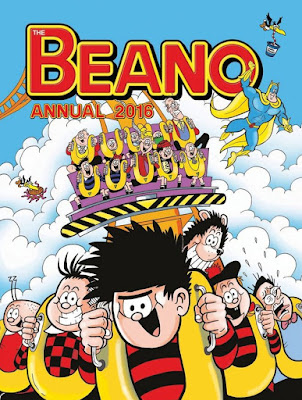There's a misconception by some that the British comics industry is dead. I've even known some to say "There are no British comics any more". I can only presume this idea came about due to the reduction of 'traditional' comics available in newsagents. True, there are far less UK comics available in your local WH Smith now, but there's still The Beano, 2000AD, Judge Dredd Megazine, Viz, Commando, and all-new strips by British creators in magazines such as Toxic, Epic!, Doctor Who Magazine, Doctor Who Adventures and a few more.
Admittedly it's definitely a far cry from the heyday of the traditional British comic periodical, but the industry is certainly not "dead". The 'business model', for want of a better term, is more variable now, and some publishers use other ways to get comics to potential readers. Aces Weekly uses the digital-only route, resulting in a very reasonably priced comic that so far has run to 112 issues as 16 volumes of 7 comics. London-based Titan Comics have several titles for teens and adult readers that are available through comics speciality stores. Children's comic The Phoenix mainly uses a subscription method of selling the weekly by mail, plus selected outlets such as some branches of Waitrose and Waterstones. Some comic shops also stock it.What The Phoenix has also done is to use the European method of serializing strips in the weekly anthology, then collecting each strip into individual books. These superbly designed books by modern new creators such as Jamie Smart, the Etherington Brothers, and Gary Northfield can be bought from High Street bookshops or from online sellers.
At the moment, those books are on special offer at The Phoenix website so hop over there now and see if any take your fancy:
http://www.thephoenixcomic.co.uk/product-category/comic-books/
Titan Comics is also using this method, collecting their comics story arcs into graphic novels. Rebellion does the same with many of its 2000AD strips. What this means is that there is a lot of product out there, and plenty for readers to choose from.
There are also new graphic novels that are produced especially for the format of course, such as Bryan Talbot's Grandville books and Darryl Cunningham's Supercrash to name but two. Some books are co-produced in Britain and America, such as the League of Extraordinary Gentlemen titles by Knockabout and Top Shelf.
Then there are the numerous small press comics which may have tiny print runs but often have great content.
If I had more time I could expand this article considerably by naming many more titles, but I think you get my point. In short, it's unfair to judge the state of the British comics industry just on the few titles that are available in newsagents. The industry now is far different and more diverse than it was in our childhood and it's definitely not dead.
A small selection of recent British graphic novels and comics...
The evidence speaks for itself. Fact is, British comics have always evolved. If they hadn't, they'd still be 8 page Edwardian tabloids with 50% text stories and short slapstick strips about jolly tramps falling down coal holes.
It's not enough to rely on distribution to newsagent and supermarket retail chains now, who charge a huge 'shelf rent' on top of the percentage they take from the cover price. Publishers have adapted to suit changing conditions, and a focus on bookshops, comic speciality stores, subscriptions, and digital comics are the solutions to keep the industry alive.
Update 18/6/2015: As someone just reminded me, these days there's also another avenue of retail; the comics conventions. With the vast increase in the number of comic shows across the UK (so many that they sometimes clash) it's become an excellent way for publishers and creators to sell their comics directly to the readers. Independent publishers have been doing this for a long time now, and the mainstream guys such as Panini, Titan, and Rebellion also often have tables at the events. Unlike the early fan-centric conventions, modern comic/media shows attract the general public, including families. An ideal way for publishers to 'cut out the middle man' and interact directly with their audience.
**********
Periodicals, graphic novels, digital comics, albums... the UK comics scene has evolved beyond the shelves of corner shops. My blog is mainly about comics of the past so I don't focus on contemporary scene as often as I might but the following sites often feature a healthy amount of British comics news...
Down the Tubes: http://downthetubes.net/
Comica:
Bear Alley Books:
As always, your opinions on this subject are welcome, so please leave a comment below.






















Không có nhận xét nào:
Đăng nhận xét